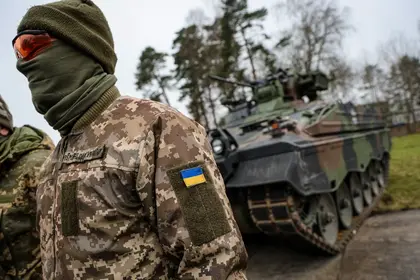For 12 hours a day and six days a week, a few hundred Ukrainian soldiers are cramming an intensive course on operating tanks in Germany, knowing full well they have no time to waste.
“Our comrades are waiting for us,” said one of the soldiers, Vitali, who gave only his first name and covered his face with a scarf to ensure his anonymity.
JOIN US ON TELEGRAM
Follow our coverage of the war on the @Kyivpost_official.
“They are expecting us to return to Ukraine as quickly as possible and help to defeat the enemy,” he told AFP.
Vitali counts among student soldiers who are learning the basics of maintenance and operation for German-made Leopard 2 tanks, as well as Marder infantry fighting vehicles.
The equipment had been recently pledged to Kyiv by Western allies, but before they arrive in Ukraine, the soldiers have to be taught to use them.
The Ukrainians, some of them straight from the front, will learn to be tank commanders, drivers and gunners in the space of just a few weeks in the middle of the forest near the small town of Munster.
The violence of war could not seem further away from the military school, where Leopard 2 tanks were parked in hangars behind big white doors. Some were being hosed down by soldiers in military fatigues.
But their hometown is always on the minds of the trainee Ukrainian soldiers, described as “very motivated” by their trainer lieutenant-colonel Markus D.
- ‘Driving a Mercedes’ -
Most of the Ukrainians being trained have limited knowledge of tanks.

Russia Claims Capture of Two More East Ukraine Villages
Only “around 20 percent” of the pupils have any significant experience with the vehicles, said Peter, the German lieutenant in charge of the training programme.
Those who have sat behind the controls of a tank before have operated Soviet-made machines that barely resemble the high-spec Leopards and Marders.
“It’s the difference between driving a Mercedes and a Zhiguli”, said Ukrainian soldier Anatoli, drawing a comparison between the German luxury car brand and a Soviet sedan.
The Ukrainians will race through their training in just five weeks. “Normally, it would take twice as long,” said German officer Peter.
In order not waste any time, the soldiers take a break only on Sunday. If the soldiers are behind “then we take Sunday too”, he added.
The courses being given by German staff are all translated directly into Ukrainian, making the teaching process more painstaking.
Much of the work is practical training, but a little theory is thrown in too.
The hands-on work takes place largely in tank simulators, housed in containers. But the students also have the chance to try out their skills on the vehicles themselves.
- ‘No choice’ -
Despite the accelerated plan, the German team say they are confident that the Ukrainians will hit their goals.
“It’s difficult but we don’t have a choice,” said Anatoli, 33, who is being trained on the Marder.
The idea of sending tanks to fight a war in the heart of Europe is uncomfortable for Germany, where the history of the country’s Nazi past weighs heavy.
Only after months of hesitation did Berlin agree in January to send 14 of its modern Leopard 2 A6 battle tanks to Ukraine to help repel Russian forces.
But pride remains the overwhelming emotion among the German soldiers.
“We know that what we are teaching our Ukrainian colleagues will be put into practice on the front and we will be able to say that we contributed,” said Stefan, the German trainer of Marder vehicles.
For the Ukrainians, there is no doubt the heavy tanks will help.
“It will have a positive impact”, said Anatoli.
“The morale will definitely be even better,” he added.
You can also highlight the text and press Ctrl + Enter






